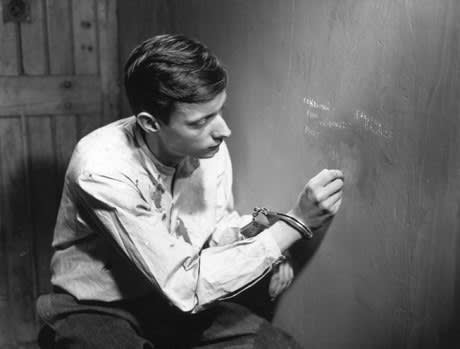Being a comprehensive Criterion package, the Blu-ray release of Robert Bresson's ascetic, cold and exact prison escape movie, A Man Escaped comes complete with three documentaries from three different decades on the subject of the reclusive, exceptionally single-minded director. The first, a 1965 episode of Cinéastes de Notre Temps, features Bresson's first on-camera interview, which is broken up into an abundance of brief quotes suggesting a focus on cinematography as an art form unrelated to performance and theatre. Amidst many protracted clips from his films, he discusses showing only the minimum visual experience for the viewer to get a sense of what is going on. Though it's never said, it's a hint at his auteur vision or projected communication of how he sees things as translated through the medium of film. This idea is discussed comprehensively in the 1984 doc, The Road to Bresson, which features conversations with Paul Schrader, Louis Malle, Andrei Tarkovsky and actors that discuss his forced suppression of their instinct to perform. This second documentary analyzes the works of Bresson and his tendency towards insular thinking—not watching anyone else's films and ignoring the progression of cinema beyond his works—noting his intensity and specific knack for crafting works of visual specificity. For example, The Man Escaped is a masterpiece of deceptive simplicity, using a mathematic, minimalist precision to document the facts and experiences of French Resistance leader Fontaine (François Leterrier) and his plan to escape prison. Shots are exact and oft-repeated, showing only the actions necessary to encapsulate the single-minded pursuit of a man seeking freedom from oppression. More than a mere prison escape movie, this cool handling of the mirror and use of actors as empty vessels or models—as Bresson puts them in some of his notes outlined in the third doc, The Essence of Forms--works as a piece about humanity and its will (no references to Schopenhauer are made). Some have referred to it as a spiritual work, while others read into the intense preservationist nature of the human psyche—one that considers killing a cellmate to protect one's own needs—presented. These concepts are discussed in detail in the third documentary but are handled with more romantic nostalgia than was presented in the earlier examinations, showing the affects that time has on perception. An essay from film scholar Tony Pipolo and a discussion about the use of sound are also included with the 2K digital restoration of a film that looks clear and crisp on the Blu-ray format.
(Criterion)A Man Escaped [Blu-ray]
Robert Bresson

BY Robert BellPublished Apr 8, 2013



